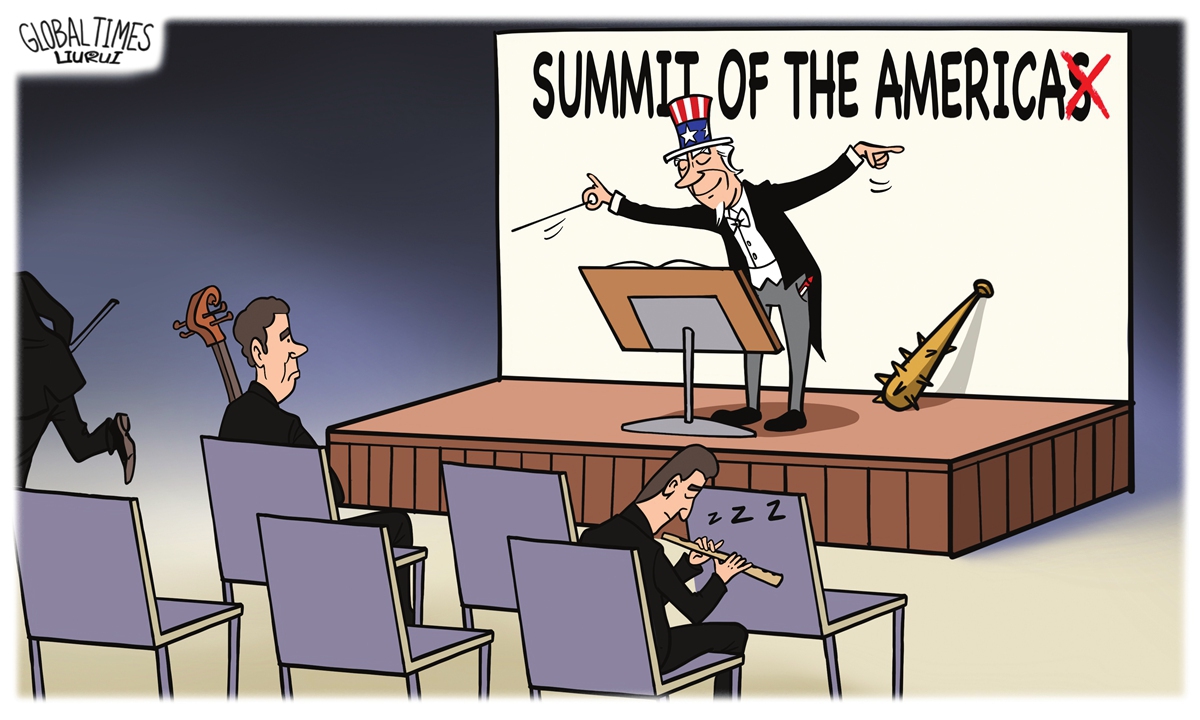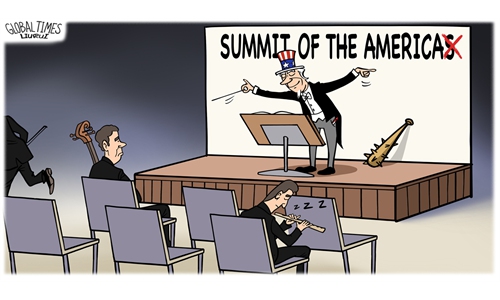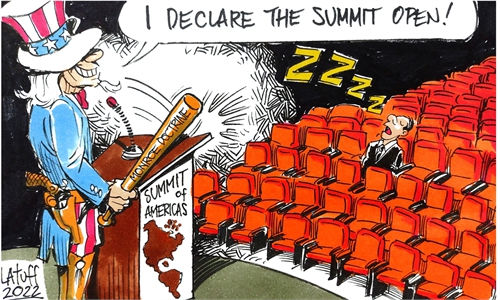
Illustration: Liu Rui/GT
On June 6, the 9th Summit of the Americas will take place in Los Angeles. It is set to be the most complicated and controversial one. A brewing boycott over the invitation list to this year's summit is enough to presume a crisis caused by the refusal of some leaders to attend if not all are invited.Initially scheduled for 2021, the summit was delayed for a year by the pandemic. This set the theme of what would be addressed at the summit, under the slogan of "building an equitable, sustainable and resilient future."
The Summit of Americas once sought the creation of a common market in the Americas, but this goal was too ambitious and consensus was not reached. Now, the summit seeks cooperation on common issues. However, it faces individual interests that impose themselves over "common interests." Such is the case of the US, which sees the summit as an opportunity to strengthen its leadership in the area and impose its own agenda on the weaker countries.
The 2022 summit sees a change in the rules of the game. Previously at the 2018 summit in Peru, then president of the US Donald Trump declined to attend, delegating the responsibility to his vice president, an action that was frowned upon by regional leaders, and seen as a contempt for the region. However, the US offered to organize the next summit, a proposal accepted by all attendees.
The selection of Los Angeles is no coincidence. It is the city that can be considered the most ethnically pluralistic, so one can presume an attempt to reconcile and call to action by the US to regain its position in the region and in the world. But the left-wing governments in Latin America will not make it easy for the Biden administration.
Although China is distant from the Latin American continent, the presence and interest of Beijing in the region is becoming more visible every day. In the past 10 years China has signed numerous free trade agreements, investment treaties, infrastructure deals and other commercial agreements in Latin America.
In addition, the BRI is gaining more and more support in Latin America, with Argentina being the first country to sign an agreement to allow the arrival of this project in the country. For this reason, the US seeks to promote its Build Back Better World (B3W) plan in the region and the summit is the perfect scenario. However, experts agree that the B3W and Growth in the Americas projects do not have the experience and planning that BRI already has.
US officials have repeatedly said that the autocratic governments of Cuba, Nicaragua and Venezuela would not be invited to the meeting which, in theory, brings together governments from all over the continent, from Canada to Chile and the Caribbean.
At the end of April and with less and less time for the organization of the summit, Cuba denounced that the US had excluded the government of the island from participating in the summit. President of Mexico soon followed suit, demanding all governments of the continent attend to have a general vision. This soon became a warning that he would not attend. To this threat of not attending if Maduro, Ortega and Díaz-Canel were not invited, the presidents of Bolivia, Chile, Argentina and Honduras were added, as well as a statement on the matter from other leaders, who, despite their rejection of Maduro administration in Venezuela, agree that Venezuela is part of Latin America and for that simple fact deserves to be invited.
Whatever the outcome, a controversial and conflictive summit is expected to be marked by the schism between Latin America and the US due to the lack of knowledge in the region caused by disinterest in the region except when Washington seeks support for its own initiatives, in addition to the growing influence of China in the region which, although denied by American officials, is a conjunctural issue; finally, left-wing Latin American countries are also confronting the US to demonstrate they "no longer want to be anyone's backyard." The message has been sent: If Latin America is assembled as a whole, it is a piece to be considered on the world geopolitical chessboard.
The author graduated in Law from National Autonomous University of Mexico, and Master in Comparative Law from China University of Political Science and Law. He collaborates as external consultant in issues related to law and internationalization of companies. opinion@globaltimes.com.cn


